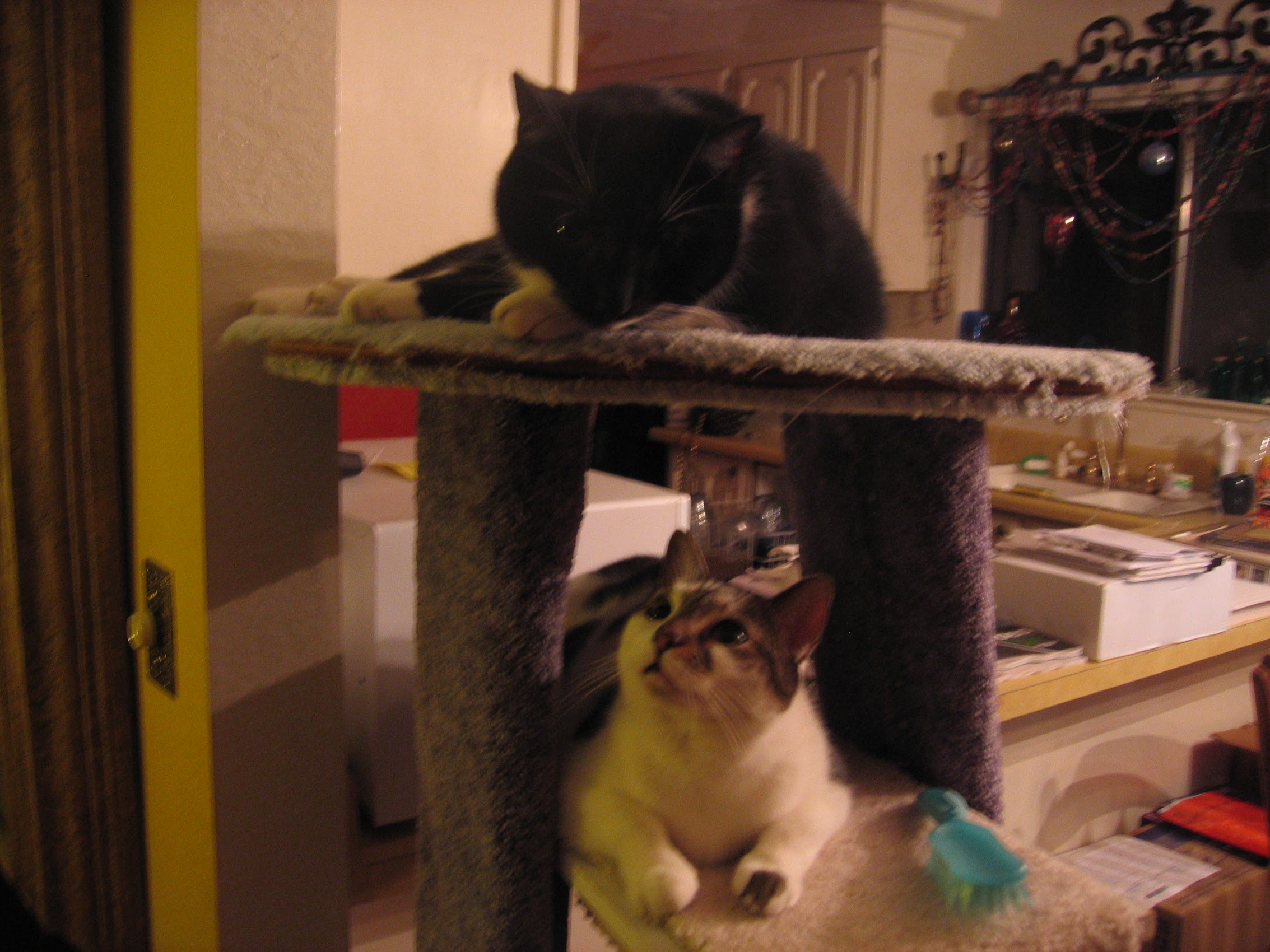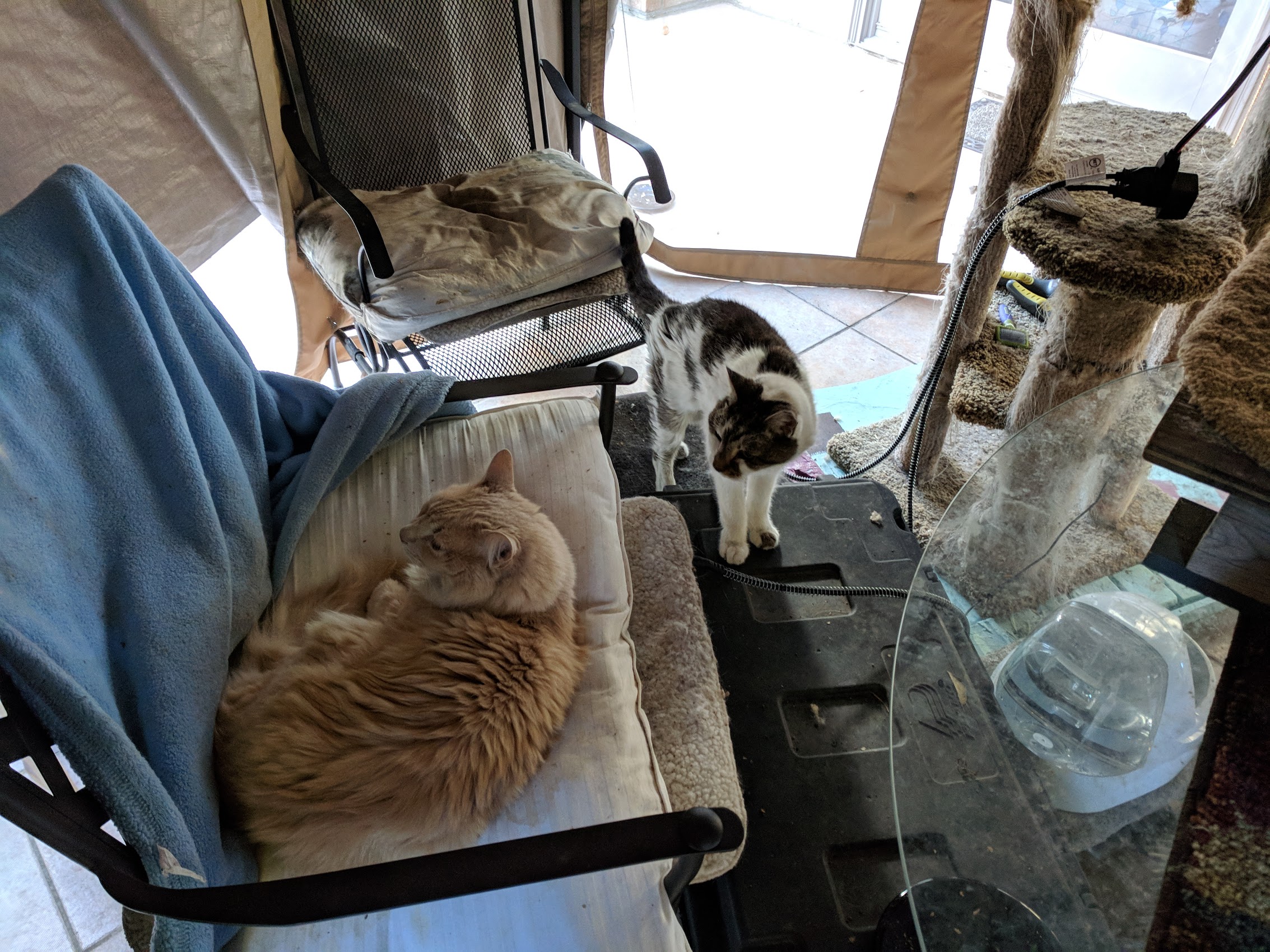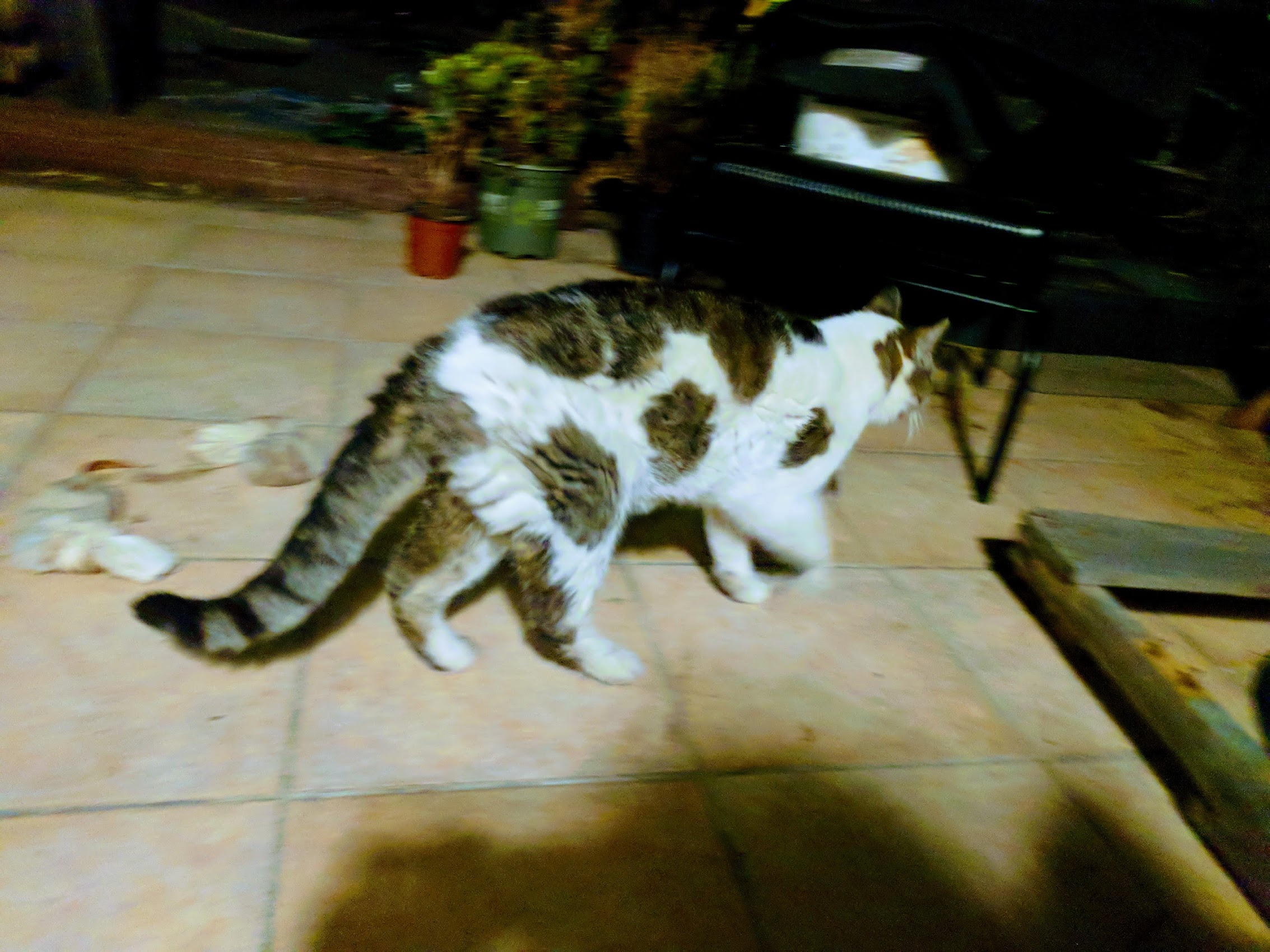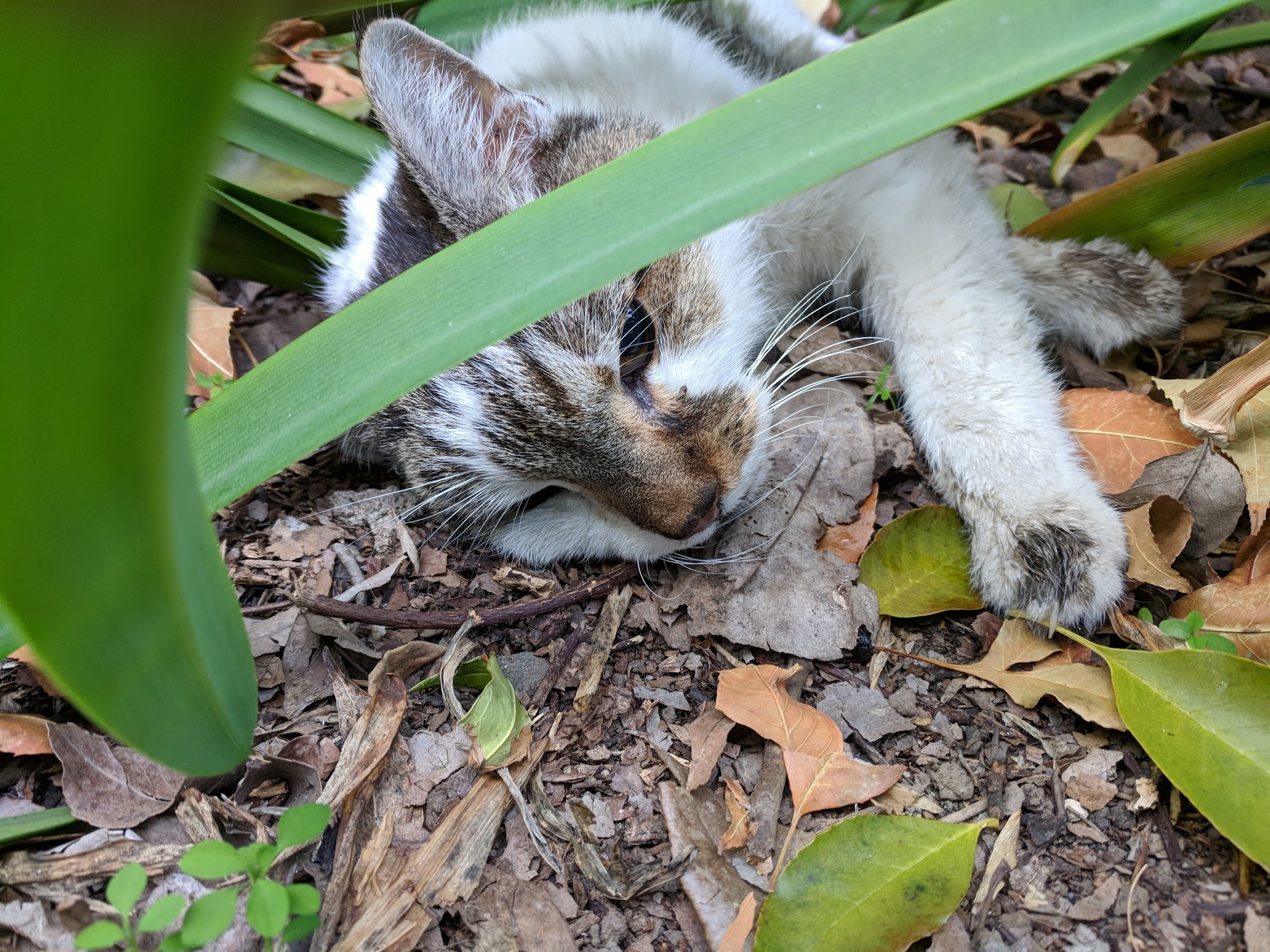
The following was written just before I left on Christmas vacation. The fact that I’m posting it three weeks later I think says something about the very point I was making in the article … so I’m going to let it stand as I wrote it the day that it happened. Here goes …
—
So, my cat died in my lap today, and while I didn’t kill it, I made it happen.
I’d love to say I have a lot of feelings about that.
The truth is, for me, departures leave a void. I don’t know what to feel, or don’t feel anything. Our precious little fraidy cat Caesar is gone, just gone, and the event passed without the reactions that movies and literature tell me happen when people go through life-changing events.
And this is a change, make no mistake. Almost twelve years ago, I and my wife agreed to adopt two rescue cats, Nero (the big black butch one) and Caesar (the skinny Holstein-cow one afraid of crinkling paper). They’d been turned out onto the street by a couple who got on drugs, and were being fostered by one of our bridesmaids, who already had three tiny, frail, elderly cats, and was forced to keep both cats in a bathroom. We had Nero and Caesar shipped from the East Coast to the West, and made them a part of our lives.

Nero’s long gone, victim of coyotes, but Caesar, with a different behavioral inheritance, survived and thrived, until a few years ago thyroid problems caused him to start to lose weight. He wasted away from twelve pounds to seven over the years, but we were mostly able to control it with medication, even when we ultimately had to put Caesar outside when, in his old age, he decided it was just fine to pee, like, wherever, because he’d reached the age where he didn’t have to give a damn anymore.
Bay Area winters are, of course, as brutal as cream puffs, but we nonetheless set up a huge gazebo enclosure in the back yard, where a tarp, pillows, heating pads and collection of chairs, tables and cat condos gave him a comfy throne for over a year.

But then he started wheezing. At first it was a cute little cooing-dove purr, and we thought he was just becoming more vocal. But it developed into a whistling, ticking sound as he labored for breath. Never comfortable on trips to the vet—always scared and panting, frequently pooping in the carrier even when in the best of health—on his last trip he was so freaked out they had to put him on oxygen. Tweaks to his medication and a cortisone shot helped for a while, but soon he was back where he started, with the recommendation of the vet that we make him comfortable.
And we did—or, mostly, my wife did.
She constantly reworked the outer area to make it a luxurious throne. A night owl herself, she fed him at all hours as, despite his decreasing weight of six and a half pounds, he became our most ravenous cat. And she stayed with him to brush him or sit with him or make him happy.

And me? I’m the one who dragged us out to the Bay Area to work for a search engine company, and I’m the one who has to work long hours keeping the lights on now that I’ve transitioned from search to robotics. I’m the one who chose to take on a huge writing project at which I’m barely started, and I’m the one who chose to take on helping found a small press. I seemingly can’t say no to projects, not because I want to do so many projects, but because that’s the only way I have found to make the projects that I do work on into successes—constantly seeking other avenues, other points of connections that make the work that I do more valuable. So now I find myself with an enormous stack of responsibilities that I can’t easily unwind.
For a variety of reasons, this has become even worse in the last six months, right when Caesar began his decline. Weekend after weekend I planned to spend time sitting in the back yard with the cats, and weekend after weekend I found myself working late at work or putting out fires at the small press. And week after week, I saw Caesar continue to decline.

I even knew this was likely to happen, and took a picture intending to blog about caring for elderly cats. But life intervened, and Caesar has now passed without me ever posting that post about his decline. I can’t look at those pictures without thinking about dereliction of duty.
Finally, I had enough, and started to arrange time to spend more time with Caesar. But it was too late. He’d grown too frail to clean himself, but no longer enjoyed brushing, pulling away from me when I tried to clean out his fur. He’d grown too scattershot to properly drink from poured water, but no longer enjoyed suckling my knuckle, making a few halfhearted attempts at the gesture that had calmed him so much as a young cat before wobbling away. I’d sit in the Adirondack chair in the back yard, hoping he’d come up and sit in my lap, and for a while he did, scrabbling his way up on me, getting a scratch, then shakily hop down and walk away. I eventually tried picking him up to put him in my lap, but he just wanted down. By the end, he barely tolerated a scratch behind the ears, and would quickly give up or walk away.
As Christmas approached, I worried that he wouldn’t be here when I got back from visiting my folks—but last night, we noticed vomit on his pillow. Today he wasn’t sitting in his throne, and I found him lying against the fence in the back yard, muzzle covered in vomit, drooling on his paws, unable to muster the energy to eat and unwilling to tolerate my touch.

I called in at work, woke up my wife, and we started calling for home pet euthanasia services. After half a dozen calls, we had an appointment arranged, and in the mid afternoon, a kindly veterinarian came by. Caesar had slid even further, with a soft, plaintive mew, and the vet gave him a sedative to help him sleep, and soon he was breathing easy for the first time in weeks.
Five minutes later, I was sitting on the porch, with Caesar in my lap. The vet shaved a small patch of fur on his leg to get to his vein, and injected the final shot. I put my hand on his chest as he breathed his last, and the vet listened until his tiny heart stopped. The vet left us an impressed paw print in clay and a tiny bundle of fur, and took our cat, wrapped up in a basket, looking more comfortable than he had in six months. Then Caesar was gone.

I wasn’t there when my dad died. I knew he was going, I even quit work so that I could be there for him while he was dying in Greenville, South Carolina, but for some reason at the time I felt like I had to periodically go back to my home town, Atlanta, Georgia, for what, I don’t remember now, to keep up the condo, or for my karate classes, or whatever, and on one of my returns to Greenville Dad passed while I was finding a parking space in the Greenville Memorial parking lot. Mom stood straight, but was in tears, and I knew what had happened; Dad’s body lay there, his eyes open, half lidded, his head turned partially aside, not rightable, the human body’s unconscious processes of self-stabilization and homeostasis finally ceased. So Dad was gone.
I wasn’t there when my grandmother died. She’d been in the nursing home for a while, and the doctors warned us that she’d had a sharp slide. We came out to see her. Mom, strangely, didn’t want to go into the room, seeming somehow semi-estranged from her, despite being about as good to her as she could have been. I went see Grandma; she was holding her hands tight, her eyes half-lidded, barely registering my presence. We waited a long time, then returned the next day, and waited again. Finally we went for a late lunch, and when we returned, it was over. And Grandma was gone.
I wasn’t there when my Aunt Kitty died. She’d been in decent health, despite a painful hip problem, and was jogging at the gym one day when she had a heart attack and fell off the treadmill. I was already on my way to Greenville for other reasons, but when I arrived, she again was barely holding on, each of her organs struggling to keep up, offloading their problems onto another. I parsed the jargon the doctors were saying and re-uttered the words to the family in words they understood, and they seemed comforted. She lay there, writhing a little; once her eyes, half-lidded, seemed to recognize me. But the family told me to leave, and after a few days, I flew back to the Bay Area. She passed the next day, and I flew back for the funeral. But Aunt Kitty was gone.
I wasn’t there when Gray Cat died. He was a feral who stayed in the yard, and we slowly started the process of trying to tame him. I was the only one who could feed him. I was the only one who could pet him, and I did it with gloves. But we had started to play together, and he started to warm—then got in through the cat door and attacked my wife. She had to fight him off with a broom, and we ultimately decided that he was dangerous enough that we had to put him to sleep. But it was my wife who took him to the pound. And Gray Cat was gone.
I wasn’t there when Caesar’s brother Nero died; as I said, he was taken by coyotes. He was an active outdoor cat, and we could even take him on walks without a leash. But that expanded his range, and he loved hunting on the watershed hill near our home. One night went out late at night, shortly before we heard the coyotes howl. He never came back. We posted flyers and walked the neighborhood, and checked shelters, but none of that mattered; we knew what happened the very next morning. And Nero was gone.
Nero’s death came without warning. I knew Caesar’s end was coming. I was determined to not let him die alone and afraid the way Nero did. So I kept close watch on him. I thought through the scenarios he might encounter and decided what I was and was not willing to put him through. The ultimate criteria, I decided, was if he could not breathe, if he could not eat, or if he could not get up; today, two of those three happened. So we acted.
I was there when Caesar died. We let him lie where he had chosen until the drugs put him into a peaceful sleep, and then I held him in my lap until he passed. And after he was gone, I asked my wife to go for a walk, and I unloaded to her about how I wanted to have been there more.
“No,” she said. “We are a team, and I was there for him, several times, every day, while you worked. While you spent your love on the cats that still wanted affection, I focused instead on Ceasar and gave him all the attention he needed. We gave him everything we could.”
I still don’t know what I feel about this. I must feel something: I’ve been prompted to write two thousand words on it. But the feeling is that of a void. An uncertainty of how I should react or how I should feel. The only thing I know is that I made sure I was there when Caesar died.
—
Epilogue: Caesar is gone. Now one of our other cats, Lenora, has erupted in tiny bumps and larger lesions, along with two big lumps in her abdomen. Is it cancer, and she’s soon to be gone? Is it simply cowpox, and she’ll be fine in a month or two? I don’t know. But I do know I am making a special effort to be with her, and with my wife, and my friends and family, while they are alive.
-the Centaur
I love you, Anthony. Reading your emotional, but with rationality, essay, I was so involved. I reviewed my own losses. I feel with you. With much love, Elaine your cousin.
[…] of our cats recently passed. Another came down with a urinary tract blockage. The third has […]